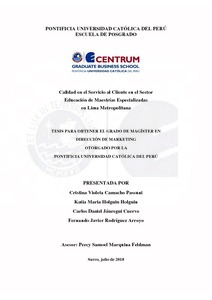| dc.contributor.advisor | Marquina Feldman, Percy Samoel | |
| dc.contributor.author | Camacho Passuni, Cristina Violeta | es_ES |
| dc.contributor.author | Holguin Holguin, Katia Maria | es_ES |
| dc.contributor.author | Jáuregui Cuervo, Carlos Daniel | es_ES |
| dc.contributor.author | Rodríguez Arroyo, Fernando Javier | es_ES |
| dc.date.accessioned | 2018-09-23T20:41:50Z | |
| dc.date.available | 2018-09-23T20:41:50Z | |
| dc.date.created | 2018 | |
| dc.date.issued | 2018-09-23 | |
| dc.identifier.uri | http://hdl.handle.net/20.500.12404/12717 | |
| dc.description.abstract | La calidad del servicio ofrecido es determinante para que las organizaciones sean
viables y exitosas. Por ello, en las últimas décadas, se desarrollaron modelos de medición
de la calidad de los servicios que son aplicados a diversas industrias, e incluso en el sector
educación se tiene escalas de medición de la calidad especialmente diseñadas para este
tipo de servicio, como es el caso de HEDQUAL. Sin embargo, actualmente, no se cuenta
con un modelo de medición de la calidad validado en la educación de posgrado del Perú.
En ese sentido, esta investigación busca validar la escala HEDQUAL en la educación de
maestrías especializadas de Lima Metropolitana, y es la primera en aplicar este modelo de
medición en Hispanoamérica. Esta investigación es cuantitativa, correlacional, no
experimental de corte transversal y explicativa; e involucra la aplicación de encuestas a
una muestra representativa de alumnos de las maestrías corporativas internacionales de
CENTRUM, las cuales recogen la evaluación de los alumnos sobre el desempeño del
ofertante de este servicio para determinar la calidad percibida. Asimismo, a través del
análisis de factores y del análisis de regresión lineal múltiple se valida el modelo
HEDQUAL en las maestrías especializadas de Lima Metropolitana con 28 escalas de
Likert y siete dimensiones: calidad del servicio del docente, calidad de los programas,
calidad de los servicios administrativos, calidad de los servicios de biblioteca,
oportunidades de carrera, calidad de la infraestructura y calidad de los servicios de
soporte. Las siete dimensiones afectan la calidad percibida de servicio, sin embargo la
calidad del servicio docente y la calidad de servicio administrativo son las que tienen el
mayor impacto, mientras que la calidad de servicio de biblioteca y calidad de servicio de
soporte son las menos significativas. Finalmente, esta investigación proporciona
información relevante sobre la calidad percibida del servicio por los alumnos de las MCI
de CENTRUM. | es_ES |
| dc.description.abstract | The quality of the service offered is crucial for organizations to be viable and
successful. For this reason, in the last decades, models for measuring the quality of services
have been developed that are applied to various industries, and even in the education sector
there are scales of quality measurement specially designed for this type of service, such as the
case of HEDQUAL. However, at present, there is no validated quality measurement model in
postgraduate education in Peru. In this sense, this research seeks to validate the HEDQUAL
scale in the education of specialized masters in Metropolitan Lima, and is the first to apply
this measurement model in Latin America. This research is quantitative, correlational, nonexperimental,
cross-sectional and explanatory; and involves the application of surveys to a
representative sample of students of the international corporate masters of CENTRUM,
which includes the evaluation of the students on the performance of the provider of this
service to determine the perceived quality. Likewise, through the analysis of factors and the
multiple linear regression analysis, the HEDQUAL model is validated in the specialized
masters of Metropolitan Lima with 28 Likert scales and seven dimensions: quality of the
teaching service, quality of the programs, quality of the administrative services, quality of
library services, career opportunities, quality of infrastructure and quality of support services.
The seven dimensions affect the perceived quality of service, however the quality of the
teaching service and the quality of administrative service are the ones that have the greatest
impact, while the quality of library service and quality of support service are the least
significant. Finally, this research provides relevant information about the perceived quality of
the service by students of the MCI of CENTRUM. | es_ES |
| dc.language.iso | spa | es_ES |
| dc.publisher | Pontificia Universidad Católica del Perú | es_ES |
| dc.rights | info:eu-repo/semantics/openAccess | es_ES |
| dc.rights.uri | http://creativecommons.org/licenses/by-nc-nd/2.5/pe/ | * |
| dc.subject | Calidad total | es_ES |
| dc.subject | Educación superior--Perú | es_ES |
| dc.subject | Investigación cuantitativa | es_ES |
| dc.title | Calidad en el servicio al cliente en el sector educación de maestrías especializadas en Lima Metropolitana | es_ES |
| dc.type | info:eu-repo/semantics/masterThesis | es_ES |
| thesis.degree.name | Maestro en Dirección de Marketing | es_ES |
| thesis.degree.level | Maestría | es_ES |
| thesis.degree.grantor | Pontificia Universidad Católica del Perú. CENTRUM | es_ES |
| thesis.degree.discipline | Dirección de Marketing | es_ES |
| renati.discipline | 414147 | es_ES |
| renati.level | https://purl.org/pe-repo/renati/level#maestro | es_ES |
| renati.type | https://purl.org/pe-repo/renati/type#tesis | es_ES |
| dc.publisher.country | PE | es_ES |
| dc.subject.ocde | https://purl.org/pe-repo/ocde/ford#5.02.04 | es_ES |






